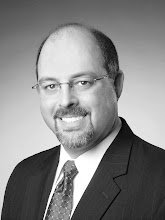CCAR Conference - Day 1
After an uneventful flight, I touched down in Tel Aviv and made my way to the David Citadel Hotel in Jerusalem where the CCAR conference was taking place.
After settling in and washing up, I soon found myself on the road again. Amir Shacham, MetroWest UJA's Israel Operations Director drove my colleague, Rabbi Elyse Frishman and I to Rishon Lezion for a "pre-convention" program. We went to Rishon Lezion to see the many projects that MetroWest is supporting for the significant Ethiopian community there. In particular we wanted to here about Addis Tasfa, the Ethiopian Microloan Project of Rabbi Soffin's Jewish Helping Hands Foundation, which I spoke about over the Holy Days.
We arrived at the Community Center in Rishon where we were met by Nadav Calderone, our congregation's Rishon (Israel emmissary), who is enjoying a vacation with his family and is looking forward to returning to our community in a few days (Nadav has since returned to Israel to be with his family). Nadav grew up in Rishon Lezion, spent alot of time at the community center and had some very good friends among the Ethiopian community. I shared with him the deep connection that Temple Shalom forged with that community while they were still in Ethiopia, through the Million Quarter Project. In response, he shared some of his experiences with his Ethiopian friends who are now settled in Israel.
After a brief tour of the Community Center (where last summer the MetroWest Diller Fellows, including Temple Shalom's Marissa Goodkin, volunteered as counselors at the Day Camp), we met with representatives of Atzmaut and Addis Tasfa. Atzmaut is a highly successful program sponsored by the United Jewish Communities of Metrowest New Jersey aimed at helping Ethiopian families successfully integrate into Israeli society. Over the past five years, a portion of our federation contributions have provided Ethiopian Jewish families of Rishon L'tzion with family education and support, educational enrichment for children, community building activities and vocational training. Already more than 10% of Rishon's Ethiopian families have been impacted by this program.

In Rishon, I visited the after-school tutoring program run by Atzmaut. The very sweet young girl in the picture to the left was very excited to share with me the reading assignment she was working on with her tutor. It all felt very familiar. Except for the venue and the fact that the book was written in Hebrew, it could have been Rockaway Borough and a Temple Shalom Reads student!
The main reason for our visit was not simply to experience the successes of our community's past outreach to this community, but to learn about a new program that is in its initial stages and which will in many ways build upon that which has come before it. Over the Holy Days, I shared with you Rabbi Soffin's idea for a Micro-Loan project to help the Ethiopian Jews now that they are settled in Israel, much as our congregation's Million Quarter Project sought to help them while they were in Africa dreaming of the land in which they now live. That project is now a reality in the form of Addis Tasfa (Amharic for "A New Hope), a project of his Jewish Helping Hands foundation.

Phase 1 is already complete with the hiring of Hedvah, the program's Ethiopian Administrator (picture here with Mordechai, Atzmaut's coordinator). Phase 2 will soon begin with approximately 40 candidates engaged in an intensive four month training program of business management and planning. After the holidays, Phase 3, the awarding of the micro-loans will take place. In addition, many of the program graduates will find themselves able to get more traditional business loans and will receive support in doing so.

That this program has already been received with great appreciation and anticipation was made most clear by the attendance of the community's Kes (Rabbi) Samai (pictured) at our meeting. Addis Tasfa has the potential to make a significant difference in the life of this new immigrant community and to integrate them more fully into the life of Israeli society. Moreover, it deeply reflects our tradition's ideal that the highest forms of tzedakah are those that give another the ability to be self-supportive.
Over the Holy Days, I asked each family to consider a minimum $20 donation to this important effort. If you have not yet done so, please consider doing so now and if you are able please consider a more significant contribution to help build this community with whom we have deep and long-standing ties.
(For those who wish, I have available in my office an in-depth explanation of this project.)
 ds in study and strolling through the Old City made for a very special Shabbat.
ds in study and strolling through the Old City made for a very special Shabbat.








